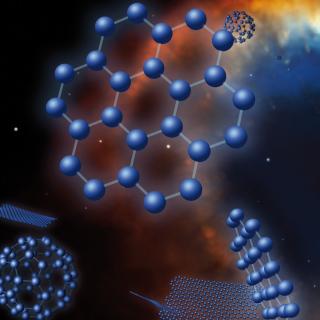Bibcode
Dell'Agli, F.; García-Hernández, D. A.; Rossi, C.; Ventura, P.; Di Criscienzo, M.; Schneider, R.
Bibliographical reference
Monthly Notices of the Royal Astronomical Society, Volume 441, Issue 2, p.1115-1125
Advertised on:
6
2014
Citations
30
Refereed citations
25
Description
The O-rich asymptotic giant branch (AGB) stars experience strong
mass-loss with efficient dust condensation and they are major sources of
dust in the interstellar medium. Alumina dust
(Al2O3) is an important dust component in O-rich
circumstellar shells and it is expected to be fairly abundant in the
winds of the more massive and O-rich AGB stars. By coupling AGB stellar
nucleosynthesis and dust formation, we present a self-consistent
exploration on the Al2O3 production in the winds
of AGB stars with progenitor masses between ˜3 and 7
M⊙ and metallicities in the range 0.0003 ≤ Z ≤
0.018. We find that Al2O3 particles form at radial
distances from the centre between ˜2 and 4 R*
(depending on metallicity), which is in agreement with recent
interferometric observations of Galactic O-rich AGB stars. The mass of
Al2O3 dust is found to scale almost linearly with
metallicity, with solar metallicity AGBs producing the highest amount
(about 10-3 M⊙) of alumina dust. The
Al2O3 grain size decreases with decreasing
metallicity (and initial stellar mass) and the maximum size of the
Al2O3 grains is ˜0.075 μm for the solar
metallicity models. Interestingly, the strong depletion of gaseous Al
observed in the low-metallicity hot bottom burning (HBB) AGB star HV
2576 seems to be consistent with the formation of
Al2O3 dust as predicted by our models. We suggest
that the content of Al may be used as a mass (and evolutionary stage)
indicator in AGB stars experiencing HBB.
Related projects

Nucleosynthesis and molecular processes in the late stages of Stellar Evolution
Low- to intermediate-mass (M < 8 solar masses, Ms) stars represent the majority of stars in the Cosmos. They finish their lives on the Asymptotic Giant Branch (AGB) - just before they form planetary nebulae (PNe) - where they experience complex nucleosynthetic and molecular processes. AGB stars are important contributors to the enrichment of the
Domingo Aníbal
García Hernández